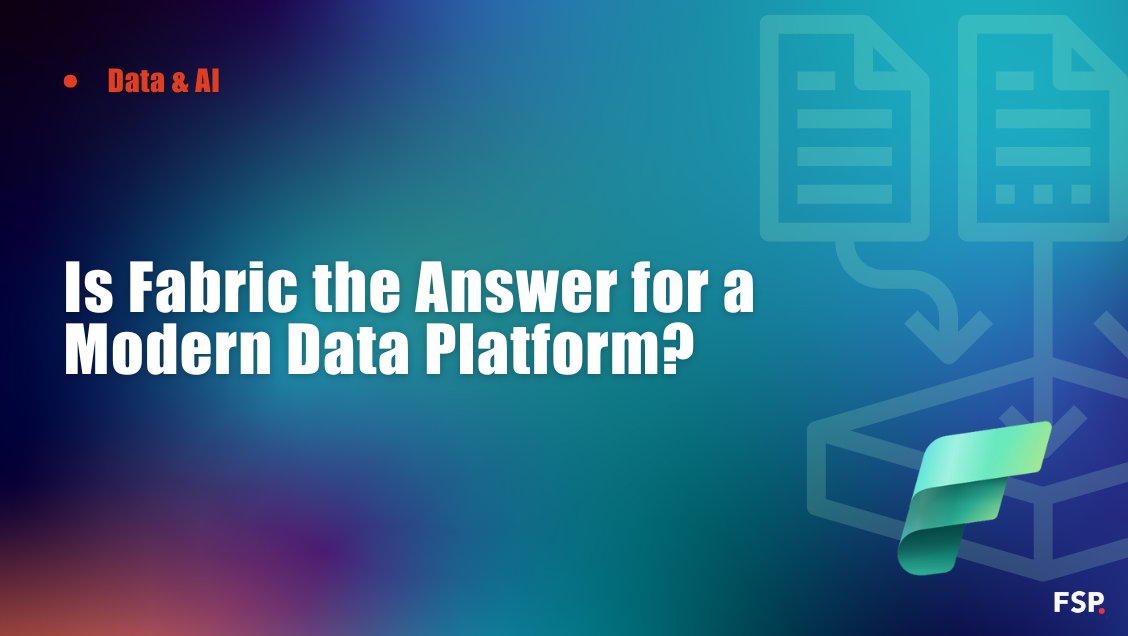This blog is part of our Data & AI spotlight series! Over the coming weeks, we are giving you a look into some of the hot topics in today’s evergreen world of Data & AI, and how working with FSP will give you a strategic edge and transform your organisation.
With the excitement around the possibilities of leveraging AI in real-world business cases, many organisations have been increasingly turning a critical eye towards their own internal data and wondering how they can make the most of it. In the fast-moving modern business world, being able to drive actionable insights and make data driven decisions for your organisation is essential. However, with the abundance of options and tools available for use, it can be difficult to know which is the right fit for your organisation. With guidance from FSP, this decision is made easier.
Earlier this year, FSP were approached by a multinational defence technology company to design and deliver a 6-week MVP (minimum viable product) built around a specific business use case, requiring the use of an advanced data platform. Their challenge is common in today’s data-driven world. Organisations collect vast amounts of data, but struggle to leverage it effectively and unlock the value.
The Challenges:
1. Data integration: Combining information from multiple internal systems and manual processes. Most organisations have many data sources and without the ability to store them in a centralised location, inefficient manual processes are prioritised instead of valuable work.
2. Data analysis: Extracting useful insights from the integrated data. Reporting and analysis are crucial to stay ahead in a data-driven world, but this becomes a challenge without a modern data platform.
3. Security constraints: A “walled garden” approach due to the sensitive nature of their work. Compliance and regulations are very important in some industries, which can be a limiting factor when choosing a data platform. Nevertheless, it’s important these requirements are adhered to.
These security measures created the following obstacles:
- Limited access to external API services
- Restrictions on moving data between internal networks
- Difficulties in using third-party solutions
As a result, the organisation often resorts to manual, time-consuming processes like using Excel spreadsheets to piece together insights. This approach is not only inefficient, but also requires frequent updates to maintain relevance.
While their situation has some unique aspects, many organisations face similar challenges in harnessing their data’s full potential.
The organisation’s key questions were:
How can we:
- Effectively integrate data at scale?
- Create a flexible platform?
- Reduce manual overheads?
- Drive actionable insights for the business?
The overarching question was: What’s the best platform or technology solution for our specific needs?
Is Fabric the Answer?
The FSP team needed to explore various options to find the most suitable solution for the organisation. This involved understanding their unique challenges and determining which tools would best address their requirements.
FSP proposed Microsoft Fabric, Microsoft’s new all-in-one data platform solution, to address the organisation’s challenges. Key outcomes and benefits included:
1. Integrated solution: Fabric unified previously disparate tools, simplifying the technology stack. A simple stack makes support and maintenance easier for the client.
2. Scalability and flexibility: The platform easily adapts to increasing data volumes and capacity needs. This organisation can continue to ingest more data when required.
3. Rapid development: We delivered a hybrid proof-of-concept/MVP within a tight timeline.
4. Process automation: We automated several manual processes, including vendor identification, spend tracking, and duplicate matching. Automating these manual processes frees up time for the organisation to prioritise other work.
5. External integration: Successfully connected with a third-party API, demonstrating the platform’s versatility, ensuring the organisation remains compliant and secure.
6. Time saving: Tasks that previously took weeks were reduced to minutes, greatly impressing stakeholders.
7. New insights: The solution uncovered unexpected findings, such as potential duplicate vendor entries between UK and Global datasets.
The FSP Advantage
The approach we took with the organisation is one we typically follow with clients for such scenarios: This project not only solved immediate problems but also opened new avenues for data-driven decision-making, demonstrating the transformative potential of the right technology solution.
Initial Workshopping: FSP collaborated with the business to identify potential use cases. The workshop involved a diverse team including developers, business analysts, and delivery managers, all operating as One Team with the organisation.
Use Case Prioritisation: FSP presented multiple use cases to the organisation and agreed to focus deeply on one primary use case within the tight timeframe.
Agile Development & Stakeholder Engagement: FSP delivered using agile methodology, including a Kanban board to track technical requirements and tasks. This ensured the organisation was aware of our progress through implementing regular checkpoints and saw continued value with iterative development.
Documentation & Knowledge Transfer: FSP developed comprehensive documentation throughout the process which included recommendations, a high-level design and future steps to move towards a production platform. The organisation was equipped to build on and manage the solution.
Our experience with Microsoft Fabric demonstrated that it was able to successfully bridge the gap between complex requirements and practical implementation, even in a highly regulated environment. While Fabric proved to be an effective solution for this particular use case, the broader lesson extends beyond the technology itself. Success in modern data initiatives requires a balanced approach: combining the right tools with appropriate planning, stakeholder engagement, and a willingness to adapt and learn. Whether Fabric or another solution is the right fit for your organisation depends on your specific context, but the principles of successful implementation remain consistent: start small, iterate quickly, and keep learning.
Are you realising how much more productive your team could be with a modern data platform? Imagine if you could drive faster decision making too – read our previous blog on data analysis to learn more.
Ready to embark on your data journey? Visit us to learn how FSP can support you

